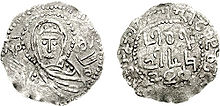George II of Georgia
- There was also a Giorgi II, Catholicos of Kartli who ruled in 826–838.
| George II გიორგი II | |
|---|---|
King of Georgia | |
| Reign | 1072–1089 |
| Coronation | 1050–1053 (in opposition to father) |
| Predecessor | Bagrat IV |
| Successor | David IV |
| Born | c. 1050 |
| Died | 1112 (aged 61–62) |
| Spouse | Elene |
| Issue | David IV |
| Dynasty | Bagrationi |
| Father | Bagrat IV of Georgia |
| Mother | Borena of Alania |
| Religion | Georgian Orthodox Church |
| Khelrtva |  |
George II (
curopalates (c. 1060) and caesar
(c. 1081).
Early reign
George's childhood coincided with the civil war between his father, Bagrat IV (r. 1027–1072), and the rebellious Georgian feudal lord
Ganja
.
Seljuk invasions


George succeeded as
Malik Shah I surged into Georgia and reduced many settlements to ruins. Harassed by the massive Turkic influx, known in Georgian history as didi turkoba, or the Great Turkish Invasion, from 1079/80 onward, George was pressured into submitting to Malik-Shah to ensure a precious degree of peace at the price of an annual tribute. George II was even able to garner the Seljuk military support in his campaign aimed at bringing the eastern Georgian Kingdom of Kakheti, which had long resisted the Bagratid attempts of annexation, within a unified Georgian realm. However, tired with a protracted siege of the Kakhetian stronghold of Vezhini, George abandoned the campaign when snow fell, and headed for the Ajameti forests to ease his disappointment by hunting. The Seljuk auxiliaries also lifted the siege and plundered the fertile Iori Valley in Kakheti. Aghsartan I, king of Kakheti, went to the sultan to declare his submission, and in token of loyalty embraced Islam, thus winning a Seljuk protection against the aspirations of the Georgian crown.[2]
Deposition
George II's wavering character and incompetent political decisions coupled with the Seljuk yoke brought the Kingdom of Georgia into a profound crisis which climaxed in the aftermath of a disastrous
Giorgi Chkondideli, to abdicate in favor of David. George is mentioned in prayers dated to 1103 as "king of kings, and caesar of all the East and West", suggesting that he was still alive and given some titles by his reigning son, but exercised no real power.[1]
References
Wikimedia Commons has media related to George II of Georgia.
- ^ ISBN 0-271-01628-0.
- ^ Lordkipanidze, Mariam Davydovna; Hewitt, George B. (1987), Georgia in the XI-XII Centuries, pp. 76–78. Ganatleba Publishers: Tbilisi.
